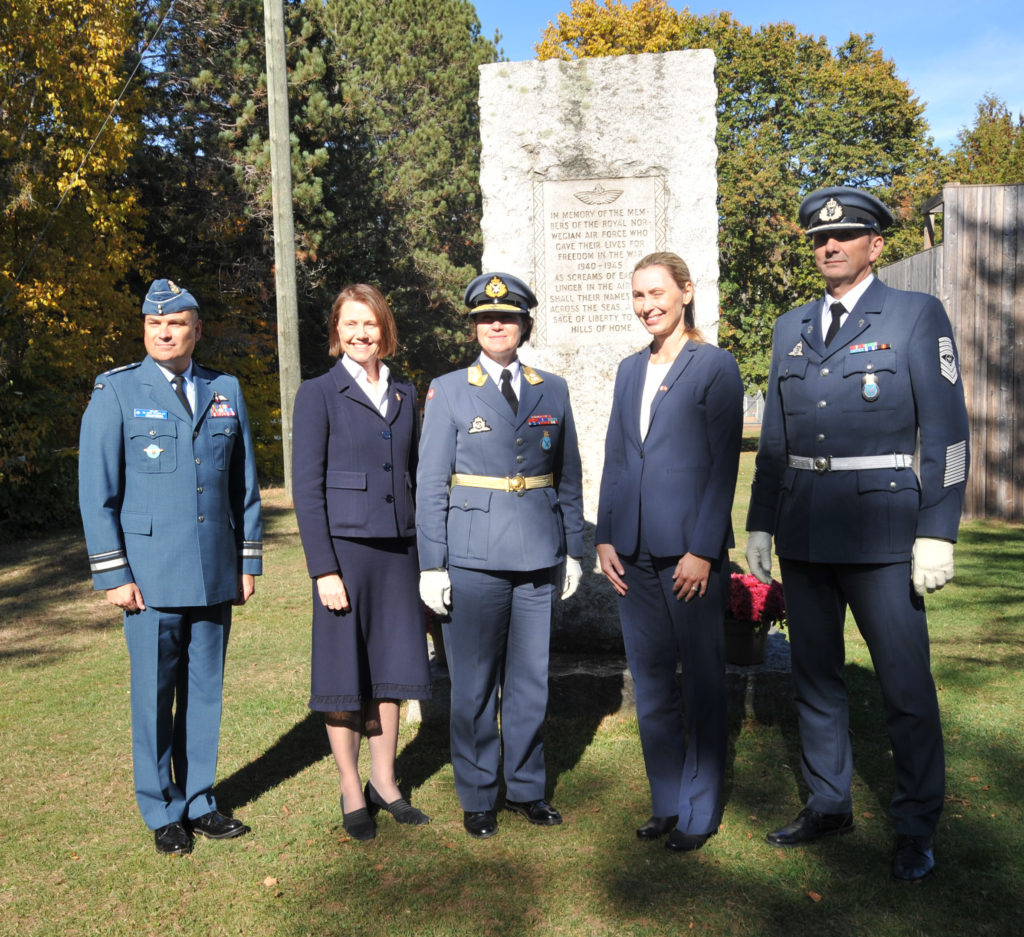Estimated reading time 8 minutes, 11 seconds.
To mark the 75th anniversary of the Royal Norwegian Air Force and Canada’s support of its founding, the heads of the Royal Norwegian Air Force, under the command of Maj Gen Tonje Skinnarland, chief of the Norwegian Air Force, travelled to Canada on Oct. 11, 2019.

Accompanied by the Norwegian ambassador to Canada, Anne Kari H. Ovind, they toured three landmarks in the history of the Royal Norwegian Air Force in Canada: Muskoka Airport, Vesle Skaugum (Olympia Sport Camp) and Little Norway Park. Together, these three places are the cornerstone of the founding of the Norwegian Air Force.
The Norwegian delegation travelled on board a CH-147F Chinook to each storied location, accompanied by Maj Gen Blaise Frawley, deputy commander of the Royal Canadian Air Force (RCAF), and other RCAF military personnel.
Muskoka Airport
Muskoka Airport was the first stop. The Norwegian delegation was welcomed by Norwegian Consul General Marianne Kortzinsky and Muskoka District vice-chair John W. Klinck. The Bracebridge Pipes and Drums accompanied the delegation in front of the terminal to greet local politicians and make their way to the location of the wreath laying ceremony, while several dozen guests looked on. Most of the attending guests had a father or grandfather who trained at Muskoka Airport between 1942 and the end of the Second World War.
Known as Little Norway, the airport was established by the Norwegian government-in-exile in London and served as the main training base of the Royal Norwegian Air Force in Canada.
During the reception following the wreath-laying ceremony, Skinnarland underlined the importance of Little Norway’s contribution to the Allied victory in the Second World War.
“The spirit of Little Norway contributed to the victory and liberation of Europe,” she said. “The freedom and prosperity that so many in our generation now take for granted was guaranteed by the men and women who trained and supported [the Norwegian aviators] here in Canada.”
Frawley emphasized the historic relationship between Norway and Canada. “With hundreds of Norwegian aviators trained here at Little Norway during the Second World War, a strong collaboration in air defence was forged between our countries. And this relationship continues today.”
The Norwegian presence in Canada is largely explained by the existence of Little Norway.
In April 1940, German military forces attacked Norway and occupied it until the end of the war. While in exile in England, King Haakon of Norway set up a government-in-exile and founded the Royal Norwegian Air Force. About 120 Norwegian soldiers and aviators came to Canada to train at the first Norwegian Air Force training camp, Little Norway, on the Toronto Islands. However, the islands became too small for the number of Norwegians, and the camp was moved to Muskoka Airport.
More than 3,300 Norwegians trained in Canada during the Second World War. Several of them married Canadian women and stayed in Canada.
One these aviators was Dagfinn Stai, now age 99. He fought against the German invasion of Norway from April to June 1940 and was at Muskoka Airport. During the reception, Ovind presented him with a medal to thank him for his service during the Second World War. Seeing this veteran receive an award for his bravery was a touching moment for all those present at the reception.
In addition to marking the beginning of a flourishing co-operation between Norway and Canada, the founding of Little Norway helped establish an important relationship based on common fundamental values.
Vesle Skaugum
After the reception, the dignitaries headed to Vesle Skaugum, also known as Olympia Sports Camp, on the edge of town, on the shoreline of Ox Bow Lake. Named in honour of the summer residence of Crown Prince Olav in Norway, Vesle Skaugum means “a house or clearing in the woods.” Purchased in the early 1940s, Vesle Skaugum was used by Norway as a rest and training camp for its pilots. A new log building was built in the early 1940s, inspired by the summer home of Crown Prince Olav in Norway.
At Vesle Skaugum, Canadian and Norwegian dignitaries visited the camp, accompanied by Sean Connelly, co-director of the establishment. One of their stops was at a stone commemorative monument erected in memory of the military personnel of the Royal Norwegian Air Force who gave their lives for freedom during the Second World War. Despite the passing of time, we still felt the warm atmosphere of Vesle Skaugum and imagined the Norwegian service men and women finding a little piece of home in a far-off land.
Little Norway Park
The representatives of the Royal Norwegian Air Force concluded their visit at Little Norway Park. Another wreath-laying ceremony at a stone monument–a gift from Norway to Canada–that was shaped by nature through glaciers. The bronze plaque and its text were completed in Norway before were they were sent to Toronto. Little Norway Park was built on the location of a Royal Norwegian Air Force training camp during the Second World War. During the ceremony, Skinnarland explained the place’s significance.
“It’s a beautiful place to commemorate those who gave the biggest sacrifice for our freedom and it reminds us of the friendship of the Canadian people during the Second World War.”
In addition to celebrating the 75th anniversary of the Royal Norwegian Air Force, this important day of commemoration is a reminder of the rich history of Norwegian air defence and the significant role played by Canada in its founding.








